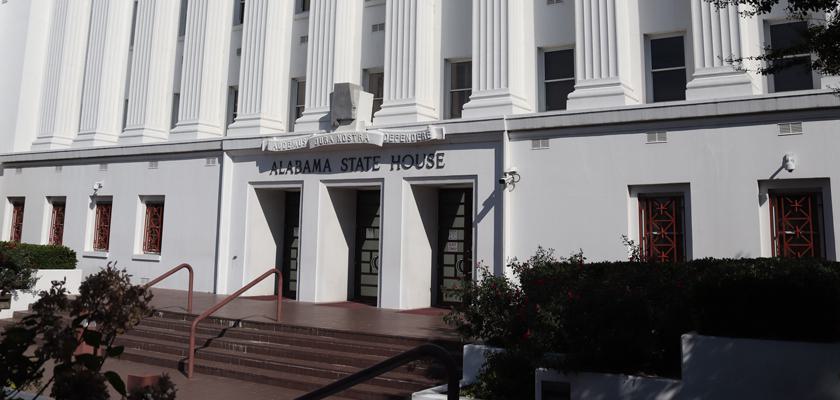The Alabama Senate Finance and Taxation General Fund Committee voted to give a favorable report to legislation that would create 21 new judgeships around the state.
Senate Bill 173 is sponsored by State Sen. Tom Whatley (R-Auburn). Whatley is an attorney, the chairman of the Senate Judiciary Committee, and the former Chief of Staff for former Chief Justice Sue Bell Cobb (D).
According to the fiscal note: SB 173 “as introduced provides for one additional circuit judgeship for the following Judicial Circuits: 5th, 6th, 11th, and 37th; and two additional circuit judgeships in the 13th, 19th, and 28th Judicial Circuits and three additional circuit judgeships in the 23rd Judicial Circuit. This bill also provides for 8 additional district judgeships in the following counties: Baldwin, Cullman, Dekalb, Etowah, Madison, Mobile, Shelby, and Tuscaloosa. According to the Administrative Office of Courts, this would increase the obligations of the State General Fund by an estimated $6.3 million for fiscal year 2023 and an estimated $8.4 million minimum for fiscal year 2024 and thereafter to fill the 21 judgeships and 55 support positions.”
Sen. Greg Albritton is the Chairman of the Senate Finance and Taxation General Fund Committee. Albritton carried the bill in committee for Whatley, who was absent due to a family issue.
State Sen. Jim McClendon (R-Springville) said, “A couple of weeks ago we got a document from the court prepared by the Chief Justice dealing with where the inequities are. Is this based on it?”
“No, I don’t think so,” Albritton replied.
“This would be an eight percent increase in district judges and a ten percent increase in circuit judges,” Albritton said. “This creates 21 new judgeships and would cost $6.3 million in 2023 and $8.4 million thereafter. This does increase the obligations on the state. We are all aware of the problem.”
State Sen. Arthur Orr (R-Decatur) said, “We have a real need around the state and we have got excess capacity in parts of the state. I see the $6 million hit in this bill and I see that we are not reallocating judges. I can’t support this particular plan...This is an easy way out, but it is not the responsible way to deal with it."
Sen. Larry Stutts (R-Sheffield) said, “Why don’t we just reallocate judges?”
Orr said, “I met with the Chief Justice this week and I think there is a way forward.”
Albritton said, “We passed the reallocation bill two years ago and there is no change.”
According to the synopsis, “Under existing law, there are currently 146 circuit judgeships in the state. This bill would create additional circuit judgeships in various judicial circuits throughout the state. Under existing law, there are currently 106 district judgeships in the state. This bill would create additional district judgeships in various counties throughout the state. This bill would also provide for the authority of the judges and for the compensation and benefits of the judges.”
SB273 was given a favorable report by the committee.
Some conservatives favor reallocating judgeships from areas like Jefferson County that have not seen significant growth in decades to areas like Baldwin, Madison, Elmore, and Lee Counties where there has been robust growth but the court system has changed little in the decades that have passed.
Advocates for the court system argue that the state has grown and population increases mean that many judgeships, particularly in fast-growing counties, need to be increased due to the increasing caseloads on the existing judges.
“Baldwin County has doubled in population since the 1990s. The courts have not kept up,” said Baldwin County Realtor and state and federal lobbyist Chey Garrigan, who has been working on this issue. “Not having enough judges means that crime victims are denied justice while their perpetrators are out on bond continuing to commit crimes because the courts can’t hold a speedy trial due to the backed up caseloads. Custody issues drag on while judges are forced to deal with crowded dockets. Business disputes can’t get resolved because their cases are delayed, and accident victims can’t get their just compensation because the insurance companies’ attorneys know they can drag the case out for years due to judges' crowded dockets.”
1819 News asked if the state has the funds to pay for this?
“When a school district grows exponentially you don’t just crowd all the new students into the existing teachers’ classrooms year after year, the schools hire new teachers," Garrigan said. "The court system has just added more and more cases to the dockets of existing judges. The only way to properly deal with this crisis is to hire more judges. The state general fund budget is the largest it has ever been. State revenues have never been higher. The need is not disputable and the money to fix this is clearly there in abundance. The courts are a constitutional responsibility of the state. Addressing the crowded judicial dockets should be the legislature’s priority for these record new revenues and not legislators' pet projects.”
According to the Legislative Services Agency, the state general fund budget (SGF) for 2023 is $2,735,852,379. That is $50,141,770 more than in FY2022. Ten years ago the state only took in $1,684,779,549. The general fund has grown $1,051,072,830 over 10 years, not counting the supplemental appropriations the legislature has been recently passing with surplus revenues from unanticipated tax collections. This year’s SGF supplemental appropriation is $119,225,398, which is in addition to the FY2023 $50,141,770 increase in the general fund.
SB173 could be taken up by the full Senate as early as Thursday.
Thursday will be day 23 of the 2022 Alabama Regular Legislative Session.
To connect with the author of this story, or to comment, email brandon.moseley@1819News.com.









